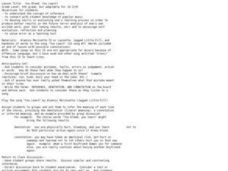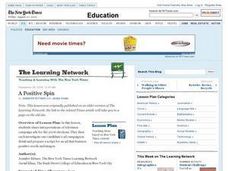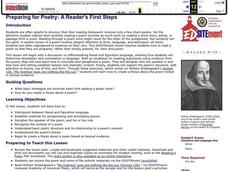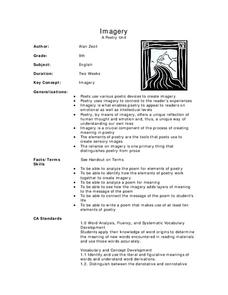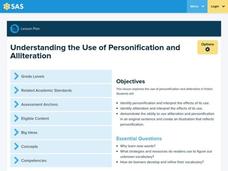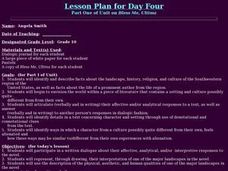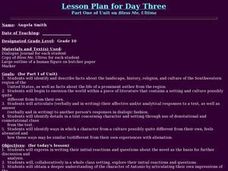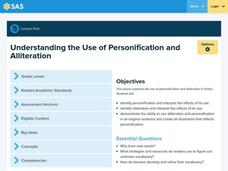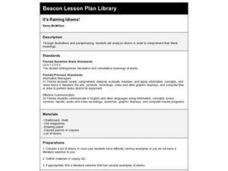Curated OER
Connotation in Propaganda
High schoolers assess persuasive techniques in propaganda. They identify and critique rhetorical devices in primary source documents (sources are not specified, but links to sites that contain various documents are included). Groups make...
Curated OER
Connotation and Denotation: How Word Choice Affects a Paragraph
Review the terms denotation, connotation, diction, and mood in paragraph writing. After defining the terms, middle schoolers practice writing examples of both connotation and denotation. They complete a connotation and denotation...
Curated OER
You Bleed, You Learn?
Jump back into the 90s with Alannis Morissette's song "You Learn." After hearing the song, small groups analyze the lyrics and write an essay about a mistake they've learned from. Use the example sentences to identify the denotative and...
Curated OER
Choosing Words Carefully
Use literacy tools to select precise vocabulary. High schoolers respond to discussion questions that require them to consider the denotation and connotation of words. They then read non-fiction passages and identify words in the passages...
Curated OER
A Positive Spin
Study word choice and connotation in advertising. Readers examine campaign ads, both negative and positive, from the 2006 mid-term election before discussing an article and analyze a campaign of any candidate they choose. Finally,...
Curated OER
Shades of Meaning
Examine and distinguish between words that have similar definitions but different connotations. Middle schoolers define connotation and denotation and participate in a "shades of meaning" contest in small groups. Groups use the...
Curated OER
"Shooting An Elephant": George Orwell's Essay on His Life in Burma
High school readers examine George Orwell's essay "Shooting an Elephant" for examples of symbolism, metaphor, connotation, and irony. They analyze how these literary tools convey the writer's main point and contribute to the persuasive...
Curated OER
Preparing for Poetry: A Reader's First Steps
Learners examine denotation and connotation in language, and paraphrase a poem. They read and analyze a sonnet by iam Shakespeare, analyze the attitude and tone, paraphrase a poem, and create a thesis about a poem based on textual evidence.
Simon & Schuster
Classroom Activities for The Call of the Wild by Jack London
Three activities are designed for readers of Jack London's The Call of the Wild. First, class members research and create posters that reflect the setting of the novel. Next, groups create posters with images that represent each chapter...
Newseum
Disinformation Nation: Is It Propaganda?
Propaganda or not? That is the question researchers must answer as they analyze techniques used in ads. Pupils use a three-part definition to determine if the ad is propaganda or advertising.
Newseum
Disinformation Nation: Checking Your Emotions
Propaganda is designed to manipulate! High schoolers learn how to recognize the devices propagandists use to evoke strong emotional reactions and practice techniques that help them avoid being manipulated.
Newseum
Disinformation Nation: Separating Politics and Propaganda
Separating political rhetoric from propaganda is no small feat. Class members are challenged to examine two different sources about a candidate in an upcoming election and determine whether the primary purpose of the source is to inform...
National Endowment for the Humanities
Dostoevsky's Crime and Punishment
Pain and suffering do not have to be inevitable in a study of Crime and Punishment. A carefully scaffolded lesson introduces readers to the divided natures of the characters in Fyodor Dostoevsky's complex novel. Groups use the...
Curated OER
Metaphor
High schoolers identify the distinction between literal and figurative language with a focus on metaphors. They complete a metaphor analysis chart, then practice expanding metaphors by composing their own comparisons of elements of the...
Schools United to Provide Enhanced Resources Network
AP English Project: Journal of Literary Terms and Devices
To prepare for the AP English exams, individuals are asked to create a notebook of literary terms and devices. The terms must be defined, accompanied by representative artwork, and illustrated by an example drawn for a named source. A...
Curated OER
Imagery
Ninth graders explore poems, various poetic devices, and identify imagery used in poetry. In groups, they examine poetic devices, define them, paraphrase and summarize poetry. Students study poetry by Robert Frost as they explore...
Curated OER
Preparing for Poetry: A Reader's First Steps
Students complete poetry analysis using William Shakespeare's "Sonnet 130" as a part of a study of figurative language. In this Shakespearean language lesson, students define literal and figurative language and practice paraphrasing and...
Curated OER
Review of Personification and Alliteration
Learners review personification and alliteration. In this literary devices lesson, students use personification and alliteration in a sentence. Learners draw a picture reflecting personification.
Curated OER
Slices of American Pie: The 1960s Through Music
Eleventh graders examine political, cultural, and social movements through music. In this 1960s American history lesson, 11th graders explore the music of the decade in order to better understand the complexity of the time period....
Curated OER
Bless Me, Ultima - 1
Tenth graders consider the importance of setting in the Southwest-themed novel "Bless Me, Ultima". As part of a larger unit, 10th graders research the setting of New Mexico and work in groups to prepare presentations about the region's...
Curated OER
Part One of Unit on Bless Me, Ultima
Tenth graders read and analyze the first two chapters of the novel, 'Bless Me, Ultima.' They respond to a partners journal entry, discuss the two major landscapes in the novel, and create a drawing/interpretation of what these landscapes...
Curated OER
Bless Me, Ultima: Dialogue Journals
Tenth graders read Chapter 1 of the novel "Bless Me, Ultima" and respond to the text. They answer and ask questions and record their impressions of different aspects of the book in a dialogue journal format with a partner. Students...
Curated OER
Review of Personification and Alliteration
Young scholars study personification and alliteration in various fiction texts. In this literary devices instructional activity, students use various texts to identify the literary devices of personification and alliteration. Young...
Curated OER
It's Raining Idioms!
Sixth graders analyze idioms and find examples from literature. They choose one idiom and finds pictures or draws pictures to show what it would mean if taken literally and what is it generally thought to mean.
Other popular searches
- Connotation and Denotation
- Connotation Denotation
- Connotation vs. Denotation
- Connotation vs Denotation
- Connotation, Denotation
- Connotation Denotation Ppt
- 113 Connotation Denotation
- Connotation Denotation Pot
- Connotation/denotation


